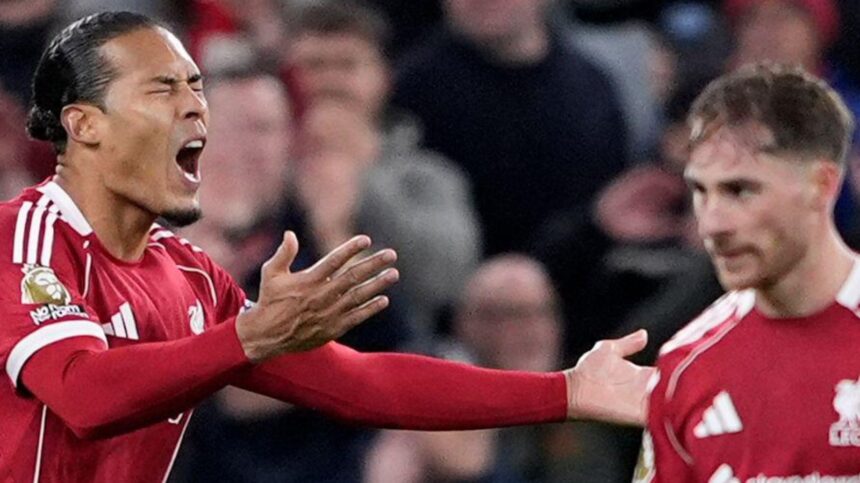Captain’s Crisis: Virgil van Dijk Admits Liverpool are in a “Mess” and Demands Teammates “Take Responsibility”
Liverpool captain Virgil van Dijk delivered a blistering, emotionally charged assessment of his team’s performance following a shocking 3-0 home defeat to Nottingham Forest on November 22, 2025. The loss, which marked the club’s sixth defeat in seven league matches and saw the defending champions slip into the bottom half of the Premier League table, prompted the Dutch defender to use unusually strong language, labeling the situation a “mess” and directly challenging his teammates to stop “pointing fingers” and start showing “manhood” and “collective responsibility.”
Van Dijk’s candid comments, which included the admission that the players are “definitely letting [manager Arne Slot] down,” represent a critical moment in Liverpool’s troubled season. The center-back’s public display of frustration and demand for accountability serves as a pivotal call to action for a squad that appears to be collapsing under the weight of expectation. This extensive analysis breaks down the full context of his quotes, the underlying issues plaguing the club, and the profound implications of a captain publicly challenging his dressing room.
The Full Quotes: Unpacking the Captain’s Scathing Assessment
The post-match interview with Virgil van Dijk was notable for its shift from his usual measured tone to one of raw, unfiltered anger and disappointment. His words were not merely an apology to the fans but a blunt critique of his colleagues’ mentality and effort.
The “Mess” and Collective Failure
Van Dijk pulled no punches in defining the state of the club, using a word rarely heard from a club captain:
“We are definitely letting him (Slot) down but we’ve let ourselves down as well. You look at yourself first and then you help each other, you help each other get out of this mess because at the moment it is a mess – that’s just a fact.”
- Managerial Pressure: By stating the players are “letting [Slot] down,” Van Dijk directly shields the new manager from immediate blame, effectively placing the responsibility squarely on the squad’s shoulders.
- Champions’ Standard: He immediately contextualized the failure against the club’s stature, saying: “As the champions we can’t be in the situation we are in right now.” This sets a clear, non-negotiable standard that the current performances are failing to meet.
The Demand for “Manhood” and Responsibility
The most damning part of the captain’s critique was his demand for a fundamental change in attitude, highlighting a perceived lack of fight, togetherness, and courage within the squad:
“It is easy to point fingers but you have to do it together. What I want is for everyone to take responsibility on the pitch. We have to do that in order to push each other, to make each other better. It’s easy to maybe just think about your own situation rather than the collective side when things are not going well.”
“You have to be a man and face the toughness and go again, again and again because if you want to give up then you are at the wrong place in my eyes because this club has gone through much adversity over those years and we’ve always come out of it.”
- Individualism vs. Collective: He explicitly calls out players for focusing on their “own situation” (perhaps their form, contract status, or future) instead of prioritizing the “collective side.”
- The Fighting Spirit: The repeated references to “losing battles,” “challenges,” and “the fight” underscore Van Dijk’s belief that the team is being out-muscled and out-hustled in the basic physical and mental aspects of the game. He lamented that “basic things” like pressing and following up are “not happening enough.”
The Context of Collapse: Behind the “Mess”
Virgil van Dijk’s comments followed a period of alarming decline for Liverpool, whose season has gone from a promising start to a dramatic freefall. The 3-0 defeat by Nottingham Forest at Anfield was merely the latest, most humiliating data point in a worrying trend.
A Defeat-Ridden Run
- The Record: Before the Forest loss, the club had already suffered five Premier League defeats, including a disheartening run of four consecutive losses in October 2025 (against Manchester United, Chelsea, Galatasaray, and Brentford). The six losses in seven league matches represents one of the worst runs for the club in the modern Premier League era.
- Defensive Frailty: The captain himself previously highlighted the core defensive problem after the 3-2 loss to Brentford in October, noting that the team had gone nine games without a clean sheet. The Forest defeat further confirmed this fragility, with the goals conceded being described by Van Dijk as “far too easy.” .
- The Tactical Breakdown: Against Forest, the goals conceded highlighted systemic failings: one from a set-piece (a recurring problem) and others through rushed, disorganized play. Van Dijk noted the team becomes “too rushed” after conceding, sensing the need to panic rather than maintain composure—a mental, not just technical, flaw.
The Post-Klopp Transition
The struggles are inextricably linked to the ongoing transition under new head coach Arne Slot, who replaced the legendary Jürgen Klopp.
- Leadership Vacuum: Klopp’s powerful personality and emotional leadership style often acted as a shield and a source of motivation. His departure has left a leadership vacuum that, despite Van Dijk’s best efforts, has yet to be fully filled by the squad’s collective senior players.
- Tactical Shift Difficulty: Slot has attempted to implement changes to the team’s high-intensity Gegenpressing system, which the players had executed almost instinctively for years. The current chaotic performances suggest that the new defensive and pressing structures have not been fully grasped or, critically, are not being executed with the required intensity and collective commitment.
The Captain’s Dilemma: Leadership in Crisis
Van Dijk’s choice to speak so forcefully after the Nottingham Forest defeat highlights the immense leadership burden he currently carries. His approach has been one of consistent accountability, even when his own performances have drawn external criticism.
Addressing External Criticism
Before the Forest debacle, Van Dijk had been forced to defend his and Mohamed Salah’s leadership qualities after criticism from former players, notably Wayne Rooney.
- “Lazy Criticism”: Van Dijk dismissed Rooney’s comments as “lazy criticism,” arguing that it is easy to point fingers when things go wrong but that such comments were absent when the team was successful.
- Personal Accountability: Even while pushing back on pundits, Van Dijk maintained his own responsibility. After the defeat to Brentford, he stressed, “Everyone has to look in the mirror, including myself.” This strategy of accepting personal blame while demanding more from the collective is a high-risk, high-reward leadership tactic.
The Psychology of the Public Call-Out
A public dressing down from a captain is a rare event and represents a calculated risk that can either galvanize a team or fractu
The Road Ahead: Turning the Tide
Virgil van Dijk’s admission of a “mess” marks a psychological watershed moment for Liverpool’s season. The challenge now shifts from diagnosis to cure.
The Mid-Week Response
The timing of the comments—on a Sunday, immediately after a devastating loss—was strategic, giving the squad only two days to digest the criticism before their crucial Champions League match against PSV Eindhoven on Wednesday, November 26.
- The Mental Test: That game became an immediate, high-stakes test of the players’ “manhood” and response to the captain’s challenge. A win, regardless of performance, would temporarily validate his harsh words; a defeat could deepen the crisis and call his leadership into question.
- Van Dijk’s Mentality: His closing words were a promise of personal action: “What am I going to do, go home and cry? No, I’m going to go home and try to think how we can turn this around and hopefully that is what everyone is doing as well.” This reinforces the idea that the solution begins with individual, honest effort, followed by collective action.
Long-Term Implications for the Season
The current crisis transcends a simple bad run of form. The club is facing a fundamental challenge to its identity and its immediate competitive goals:
- Title Hopes: With the team sitting in the bottom half of the table, their defense of the Premier League title is, for all intents and purposes, over. The focus must immediately shift to salvaging a top-four finish to secure Champions League football and the necessary revenue for next season.
- Managerial Authority: While Van Dijk initially deflected blame from Arne Slot, continued poor results will inevitably lead to increasing scrutiny of the manager’s authority and control over the dressing room.
- The Transfer Market: The performance crisis will undoubtedly influence the club’s strategy in the upcoming January transfer window, as the current squad has clearly demonstrated deficiencies in depth, leadership, and perhaps, talent, especially if the current players fail to heed the captain’s call for increased responsibility.
The “mess” is now public, defined by the captain himself. The next few weeks will determine if this was the low point before the rally, or merely the beginning of a prolonged period of adversity for the Premier League champions.





